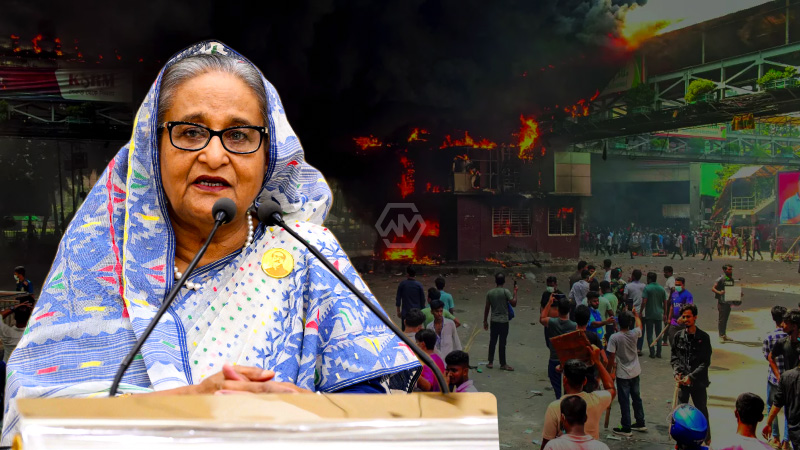- PM Sheikh Hasina cancels trips to Spain and Brazil due to violent protests.
- Protests over job quotas and high youth unemployment lead to 115 deaths.
- Army deployed, internet blackout imposed, and curfew in effect nationwide.
Bangladesh is experiencing significant turmoil as violent protests over government job quotas and high youth unemployment have led to at least 115 deaths this week. Prime Minister Sheikh Hasina has canceled her planned overseas trips to Spain and Brazil, focusing instead on the escalating domestic crisis.
The protests, primarily driven by students, have resulted in widespread clashes with police, prompting the government to deploy the military and impose a nationwide curfew.
Violent Protests Force Bangladesh PM to Cancel International Visits
The unrest has also led to severe disruptions, including an internet blackout that has impacted financial services such as ATMs and mobile money. The situation remains critical, with protesters attempting to shut down transport networks and businesses. Amnesty International has condemned the government’s heavy-handed response and called for an independent investigation into the deaths. Meanwhile, efforts are underway to repatriate foreign students, with nearly 1,000 Indian students already returned to their home country.
The root of the protests lies in the reinstatement of a 30% job quota for families of veterans from the 1971 war of independence, a policy that critics argue is outdated and misused. High youth unemployment, which stands at around 40%, has further fueled the discontent among students. The situation has been exacerbated by the closure of universities and attempts by protesters to shut down transport networks and businesses, leading to a significant impact on the country’s economy and daily operations.
The international community has taken notice, with Amnesty International calling for an independent investigation into the deaths and criticizing the government’s aggressive tactics. In response to the escalating violence, nearly 1,000 Indian students have been repatriated from Bangladesh, with ongoing efforts to ensure the safety of thousands more. The repatriation process has involved coordination between the Indian High Commission in Dhaka and local authorities to facilitate safe travel.
Despite the government’s measures, the protests show no signs of abating, posing a significant challenge to Prime Minister Hasina’s administration. The curfew, initially lifted for a brief period, remains in effect, and the government is closely monitoring the situation to determine the next steps. The unrest has not only highlighted the deep-rooted issues within Bangladesh’s job market but also raised questions about the government’s ability to manage dissent and maintain stability.
The ongoing protests in Bangladesh highlight the urgent need for addressing youth unemployment and revisiting outdated policies. The government’s response will be crucial in determining the country’s stability and future direction.
“The rising death toll is a shocking indictment of the absolute intolerance shown by the Bangladeshi authorities to protest and dissent,” Babu Ram Pant of Amnesty International said.



